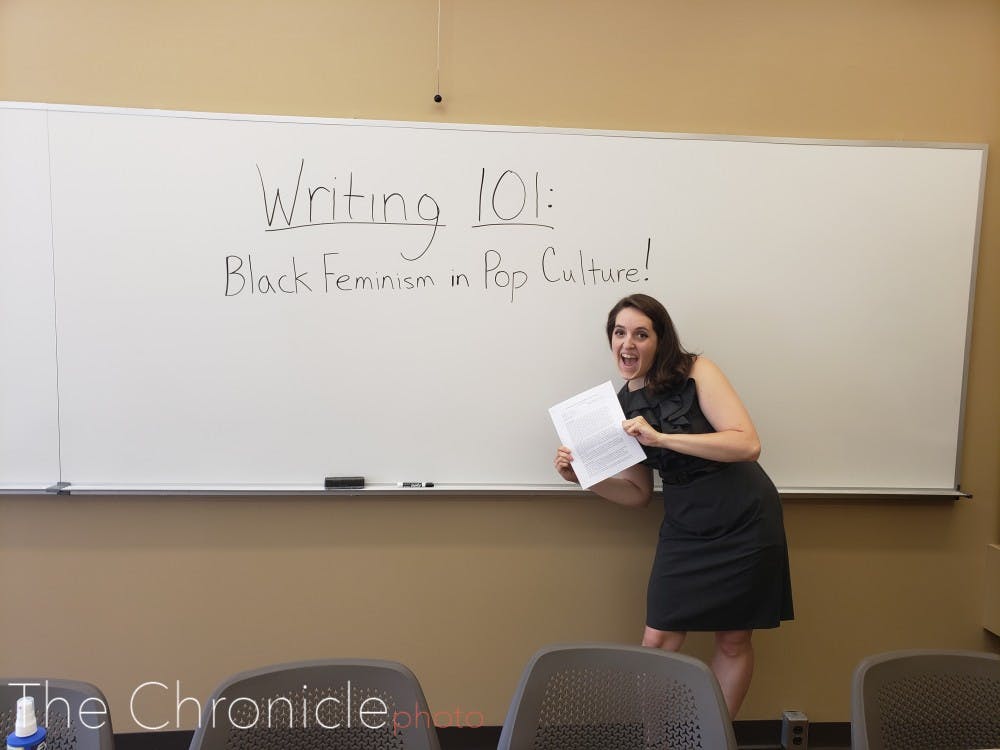A new Writing 101 tackles writing skills through a novel and underrepresented angle—the black feminist movement.
Jessica Covil, a third-year doctoral candidate studying English, African and African American studies and gender, sexuality and feminist studies, is the creator and instructor of the Black Feminism in Pop Culture course. This class presents the principles of effective communication through the lens of feminist activism in the 1970s and 1980s, a revolution that experienced a resurgence in 2013 in the form of the modern Black Girl Magic movement.
Covil, who is white, explained that she created this course around the idea of building “a safe space where people could call out problematic statements, [and] where voices that are already marginalized in society are not going to be re-marginalized in the classroom.”
She cited her approach to teaching a course of this nature to a class she took called “Teaching Race, Teaching Gender,” as it allowed her to listen more thoroughly as a teacher and stimulate open discussion around student experiences and backgrounds.
“Something told me that a class like this doesn’t show up a lot in the course catalog,” Covil said. “I remember as an undergrad myself, I went to college as a low-income student and it was that sort of position as a lower income woman, that always attracted me to narratives of struggle and striving.”
One first-year student in the class, who requested anonymity, questioned whether the teacher’s identity reflects the values being reinforced in the course.
“She is an amazing instructor, and the way she’s teaching is on point, but maybe it would be better to give that post to a black feminist, just because white women already have a lot of positions of power and influence in the feminist movement,” said the student.
The student emphasized their hope that Duke will take lived experiences and racial backgrounds into consideration in the future.
Covil said she doesn’t pretend to have every angle on the black feminist perspective, noting that she hopes that a course like this can bring unheard voices to the forefront of modern discussions.
“This is something I’m constantly aware of in my academic research, in my writing and in my teaching of the class,” she said. “I want to ensure I’m never re-perpetuating the trope of a white woman coming in and telling students what to do.”
First-year Ayesham Khan attributed her choice to take the course to the feminist movements she’s seen in her hometown of Lahore, Pakistan.
“I wanted to learn about the black feminist movement because I think it would be good to understand its history, organization, and how it took traction,” she said. “I personally relate to black feminism more than I do white feminism, and the discussions in this class make me feel like I can speak without someone policing [me].”
Khan noted that her learning in the class has impacted how she views nascent movements in Pakistan.
“We have the Aurat March, or the Women’s March, and it’s grown exponentially in the last two or three years,” she said. “However, compared to here, I think what I’m learning from the class is that we have a long way to go back home.”
First-year Raymond Zhang added that he hoped taking the class would allow him to experience a new culture.
“When I was looking through all the lists for Writing 101 classes, I chose this because I’m from China and this is a part of the public sphere here in America that I didn’t get to interact with at all in China,” Zhang said. “This is something that I wanted to reach out to as someone who hasn’t experienced this culture.”
At this point in the semester, the course is delving into the modern era, with conversations surrounding slam poetry, music and the artistic makings of black female empowerment.
First-year Kristin Ankoma-Sey, from Houston, highlighted how the course has augmented her view of colorism.
“I’m just grateful that I was able to take this class and learn more about black feminism,” she said. “In high school, I didn’t really get the chance to read many black female writers in a classroom setting, and having an open space where everyone is able to speak their truth has made me extremely grateful.”
Khan had one suggestion for future course offerings, stating that she feels there is a need for a better representation of the diversity of black feminism outside of the United States.
“[The course is] very American. Since it’s black feminism there’s been a lot of diasporic longing in the readings, but there aren’t a lot of voices that are actual African,” she said. “I think both types of voices need to be given importance, especially given the need for a more global outlook at a place like Duke.”
Covil explained that there is real potential to expand this sort of coursework and programming into other departments at Duke. Next year, she said she would be teaching a 1990s English class that would incorporate black feminism.
Get The Chronicle straight to your inbox
Signup for our weekly newsletter. Cancel at any time.

